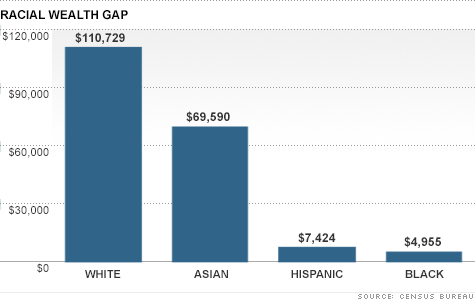Worsening wealth inequality
by race
@CNNMoney June 21, 2012
The Great Recession has widened the wealth gap, and race is a major factor.
NEW YORK (CNNMoney) -- White Americans have 22 times more wealth than blacks -- a gap that nearly doubled during the Great Recession.
The median household net worth for whites was $110,729 in 2010, versus $4,995 for blacks, according to recently released Census Bureau figures.
The gap between the races widened considerably during the recent economic downturn, which whites weathered better than blacks, Hispanics and Asians.
The latter three groups saw their median household net worth fall by roughly 60% between 2005 and 2010, while the median net worth for white households slipped only 23%.
This allowed whites to leap ahead of Asians as the race with the highest median household net worth.
The racial wealth divide is nothing new. Black and Hispanic Americans have historically had lower incomes, higher unemployment and less education.
That makes it more difficult for these groups to save money and put their capital to work building wealth, said Tatjana Meschede, research director of the Institute on Assets and Social Policy at Brandeis University.
The Great Recession exacerbated the problem. In 2005, the net worth difference wasn't quite as stark. Whites had 12 times more wealth than blacks and 8 times more than Hispanics.
The main reason blacks and Hispanics did not fare as well during the economic downturn is that home equity makes up more of their wealth than it does for whites. The housing bubble that preceded the collapse pushed up homeownership rates among blacks and Hispanics, who relied more heavily on high-cost subprime loans to finance their purchases.
As a result, the implosion of the real estate market had a more devastating impact on black and Hispanic communities.
Asians, meanwhile, are more concentrated on the West Coast, which was hit harder by the mortgage meltdown. And the arrival of new Asian immigrants in the last decade contributed to the decline in overall wealth, according to Rakesh Kochhar, co-author of the Pew Research Center report on wealth.
Pew found that in 2005, home equity made up nearly two-thirds of the net worth of Hispanics and 59% of blacks, but only 44% of whites.
Blacks and Hispanics are also less likely to have assets in the financial system, such as savings accounts or stocks, Kochhar said.
And these groups also suffer from far higher unemployment rates than whites, whose unemployment rate is 7.4%, below the national average. Blacks, on the other hand, have a 13.6% unemployment rate and Hispanics, 11%.
The widened wealth chasm could have major ramifications going forward, experts said.
Having less wealth and home equity means it will be more difficult for blacks and Hispanics to send their children to college, which gives them a leg up on landing good jobs, said Roderick Harrison, senior research scientist at Howard University. That will further extend the wealth gap.
"The implications will be with us into the next generation, which will have greater difficulty in getting the kinds of jobs needed to start saving and building wealth," Harrison said.
